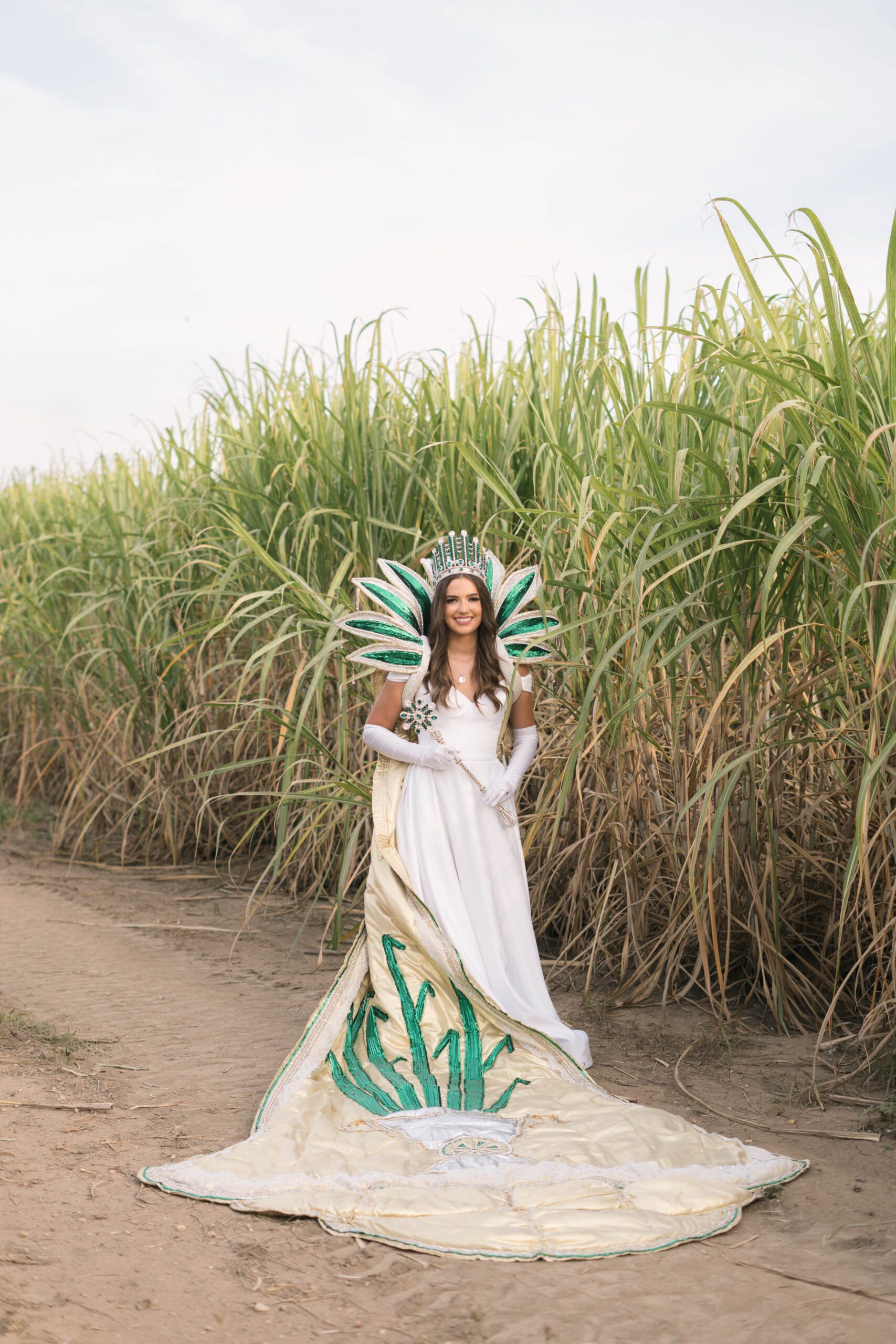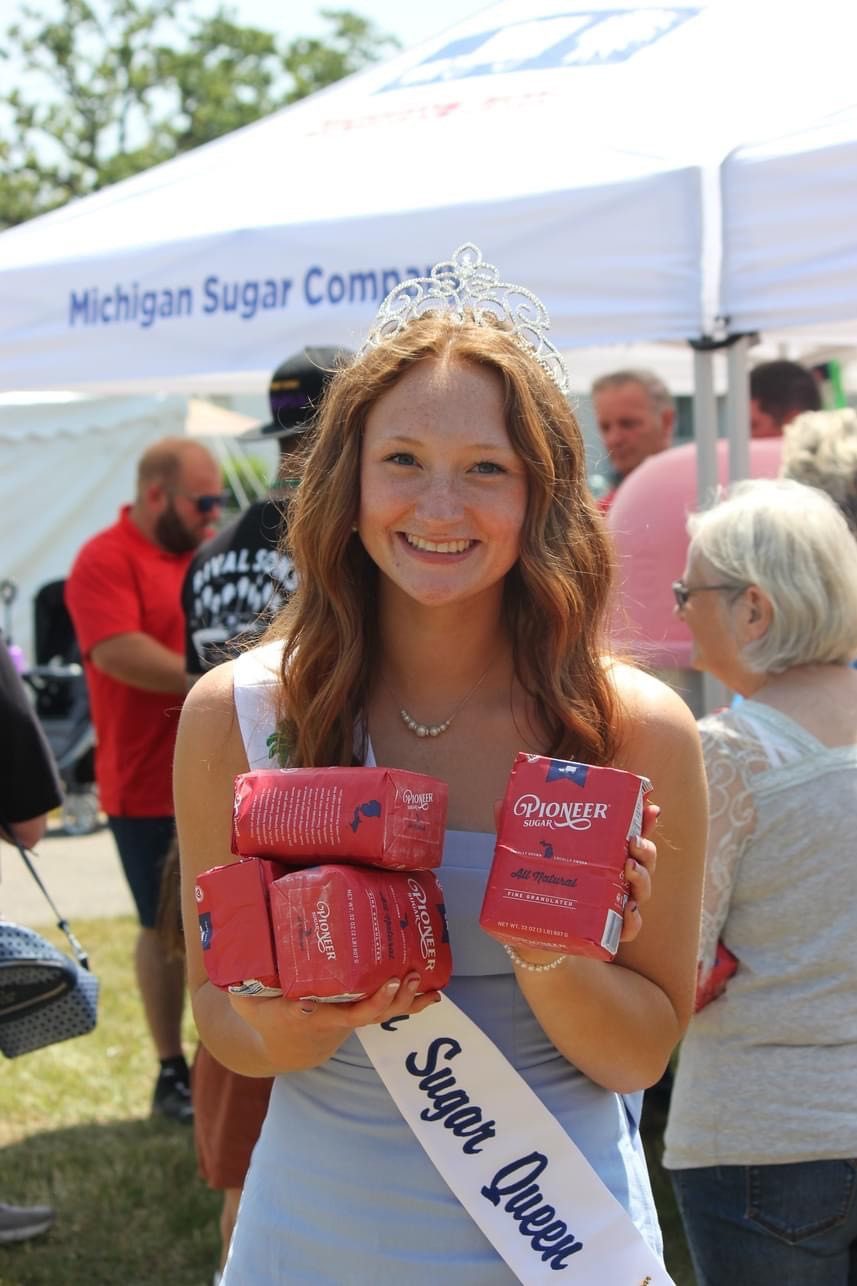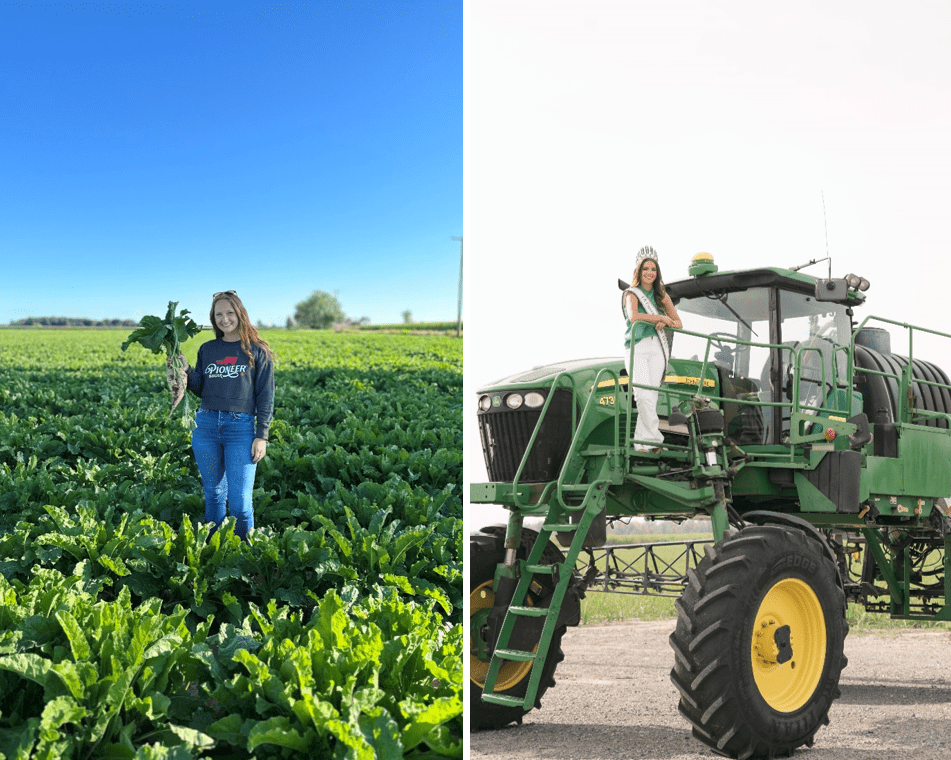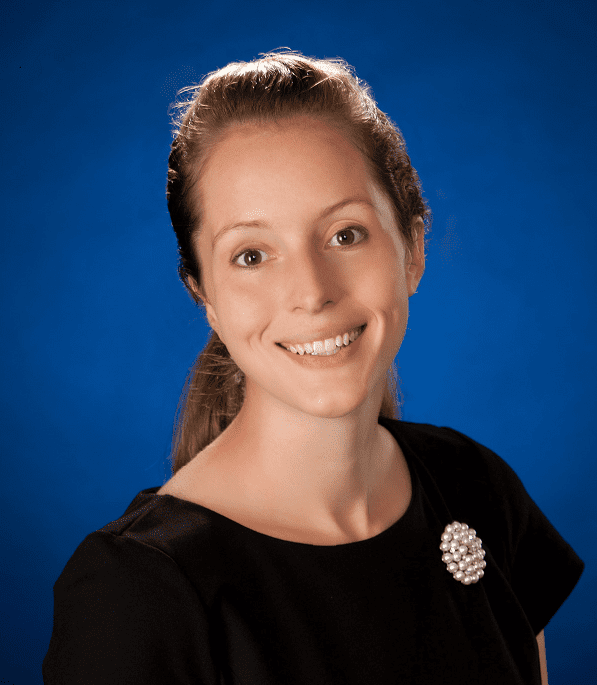 When Michigan Sugar Queen Kassie Acker of St. Louis, Michigan, and Queen Sugar LXXX Kami Hymel of St. James Parish, Louisiana, received their titles in 2023, it was much more than just a moment in the spotlight. Acker, 21, and Hymel, 22, were also committing to a year of advocacy, ambassadorship, and service for the sugar beet and sugarcane industries in their respective regions. The crowns from the 58th Michigan Sugar Festival in Sebewaing and the 80th Louisiana Sugar Cane Festival in New Iberia carry the weight of history and proud tradition while also symbolizing the bright future of the American sugar industry. Acker and Hymel don’t wear them lightly.
When Michigan Sugar Queen Kassie Acker of St. Louis, Michigan, and Queen Sugar LXXX Kami Hymel of St. James Parish, Louisiana, received their titles in 2023, it was much more than just a moment in the spotlight. Acker, 21, and Hymel, 22, were also committing to a year of advocacy, ambassadorship, and service for the sugar beet and sugarcane industries in their respective regions. The crowns from the 58th Michigan Sugar Festival in Sebewaing and the 80th Louisiana Sugar Cane Festival in New Iberia carry the weight of history and proud tradition while also symbolizing the bright future of the American sugar industry. Acker and Hymel don’t wear them lightly.
“To me, the Queen Sugar and King Sucrose titles from the Louisiana Sugar Cane Festival represent all the hardworking men and women in this industry and their dedication to feed America,” said Hymel, the daughter of fourth-generation sugarcane farmers Stevie and Kim Hymel. “There are so many years I remember waking up earlier than most families on Christmas morning to open gifts with my father before he had to leave for work, because Louisiana’s sugarcane harvest goes into December and even January. I also remember watching my grandfather cry when the cane crop was knocked down by a hurricane. These are the realities of many of our farmers. These titles represent those families that sacrifice and care so much about this industry so they can provide for others.”
Celebrating family farmers, industry employees, communities and everyone who enjoys sugar are what these festivals are all about.
In Michigan, the history of celebrating the sugar beet is well-documented. Bertha Binder of Sebewaing is regarded as “America’s first Sugar Queen,” according to an article published in 2003 in the “Sebewaing 150” history book. Binder, whose father was a boiler tender at Michigan Sugar Company’s Sebewaing factory for many years, was one of six contestants competing for the title at the Tuscola County Fair in 1933. After receiving the title, Binder appeared in a parade later that year riding on a float inside a giant sugar beet. She wore a crown with a giant “S” on the front that presumably stood for “sugar.” In 1965 Mary Ann Hornbacher became the first modern-day Michigan Sugar Queen during the first ever Michigan Sugar Festival in Sebewaing.
During her reign, Binder established an enduring tradition of advocacy by traveling to Chicago in 1933 to represent her hometown as the “Sugar Queen.” Today, the Michigan Sugar Queen Scholarship Program crowns a queen and two attendants each year at the annual Michigan Sugar Festival in June. These three young women serve as ambassadors for Michigan Sugar Company for one year and their duties include public appearances, community service projects, interaction with lawmakers and agriculture leaders, and helping to represent Michigan Sugar Company throughout the state. After completing the requirements of the program, the queen receives a $4,000 scholarship and each attendant a $2,000 scholarship to be used for college.
Acker was in middle school when she first became aware of the scholarship program. 
“I came from a community that grows sugar beets and I was intrigued by the crown, sash, and of course, sugar,” said Acker, whose deep love of agriculture started at a young age.
“My father worked on local farming operations, helping during planting, harvest and everything in between. I grew up showing livestock from rabbits to cattle at the Gratiot County Fair for Youth,” she said. “When I reached high school, I became an active participant in Future Farmers of America (FFA) where my passion for promoting agriculture deepened.”
Acker had known several women from her community who had participated in the contest and in 2023, she decided to compete for the crown.
“As I went through high school and then on to college, I began seeing the contest more as an opportunity to deepen my roots in agriculture, since I was not raised on a farm,” said Acker, who will start her senior year at Michigan State University this fall.
The Michigan Sugar Queen Scholarship Program contest kicks off with an application that transitions to two interview phases. Participants who successfully complete a preliminary telephone interview then spend a day at the Michigan Sugar Company’s corporate office in Bay City.
“The contestants get to know each other during this time by engaging in team building activities and projects,” Acker said. “There is also another interview where we were able to share our personal stories, knowledge of the cooperative and understanding of sugar beet production.”
Contest participants come from diverse backgrounds, ranging from young women who have no connection to agriculture to those whose families have been growing sugar beets for more than a century.
“Since I am not from a background of sugar beet production, I prepared for the interview day by calling local farmers in my area to learn all I could about the crop,” Acker said. “I watched countless videos on planting, harvest and processing to truly understand what the season entails. I also familiarized myself with the sugar beet growing areas and number of growers in the cooperative so I could successfully represent the company and the farmers.”
Acker also draws on this knowledge every day during her summer job as an agricultural sales intern for Wilber-Ellis.
“I spend most of my days scouting sugar beets, as well as potatoes, corn, soybeans and wheat, and check for environmental stress and crop nutrition,” said Acker, who is majoring in Agriculture, Food, & Natural Resources Education with minors in Agribusiness Management, Agronomy, and Environmental Studies.
“In my last semester before graduation, I will be student teaching,” she said. “That experience will prepare me to take a full-time teaching position upon graduation working in a middle or high school, teaching agriculture education and serving as an FFA advisor.”
In southeast Louisiana, the small town of New Iberia hosts the annual Louisiana Sugar Cane Festival every September to celebrate sugar, one of the world’s oldest and sweetest commodities.
The festival began in Iberia Parish in 1937 to commemorate the year the Iberia Sugar Cooperative was built but was put on hold from 1941 to 1945 due to World War II. When the war ended, the 5th annual Louisiana Sugar Cane Festival resumed on September 27-29th of 1946. Now in its 81st year, the festival attracts 10,000 visitors and promotes awareness of the sugar industry through a wide variety of activities for people of all ages.
The highlight of the festival is the coronation of “Queen Sugar” and “King Sucrose.” The first ever Queen Sugar was Alberta Mestayer in 1937. She was selected by popular vote of the townspeople and crowned by Lieutenant Governor Earl K. Long, the first King Sucrose. A beloved tradition was started and 24 sugar producing Louisiana parishes now compete in the Queen Sugar contest. Each parish selects a queen, who then competes for the coveted Queen Sugar title at a pageant on Saturday evening, and the winner is chosen by a panel of judges. A group called the “King’s Society,” comprised of past King Sucrose titleholders, selects each year’s king. King Sucrose is selected based on his involvement and contributions to the sugar industry.
By participating in the Queen Sugar pageant and winning the crown, Kami Hymel is continuing a proud family tradition and legacy.
“I was eight years old when I first saw Queen Sugar and King Sucrose. It was in 2009 when my late grandfather George ‘Scrap’ Hymel was chosen as King Sucrose LXVIII. As someone who was heavily involved in the sugar industry and had dedicated his life to it, he had always thought about being King Sucrose,” she said. “My granny Denise said that for him, it was the greatest honor to have been selected King Sucrose. She said our whole family shared in the honor and felt like royalty that weekend. He continued to feel the pride all the years after when he attended the festival as a former king.”
That weekend Hymel decided she wanted to be Queen Sugar one day. Hymel’s road to the Louisiana Sugar Cane Festival started when she won the titles of Teen Miss St. James Parish, Teen and Miss Festival of the Bonfires, and then Miss St. James parish.
“Pawpaw, as we called him, passed away in 2022. When my chance came to compete for Louisiana Queen Sugar that following September, he was heavily on my mind the entire weekend,” she said. “I knew he was watching and cheering me on, but he was definitely missed. My family reminds me every day how proud I made him.”
Hymel’s favorite childhood memories are of riding in tractors with her father Stevie.
“I was always very interested in my dad’s farming career, so growing up I would ask him questions. When I became of age to compete for Queen Sugar, I decided to do my own research and really dive deep into the sugar industry,” she said. “I was determined to know everything about it because I knew being Queen Sugar meant not just representing our farmers, but everyone who falls under the sugar industry umbrella. I toured our local sugar mills as well as the Louisiana Sugar Refinery, and even did research on sugar beets.”
Hymel uses that knowledge each day of her year as Queen Sugar, while traveling throughout Louisiana promoting the festival and the Bayou State’s sugarcane industry.
“As Queen Sugar, I travel to different fairs and festivals every weekend. The most important part of my job is to interact with the crowd in attendance,” she said. “Through engaging with the public, I am able to share information about the sugarcane industry.”
Hymel’s activities have also included speaking with local elementary school classes, volunteering at community events, and meeting elected officials and other notables, such as former NFL quarterback Drew Brees.
“So far this year, I have met with Louisiana Governor Jeff Landry, Senators John Kennedy and Bill Cassidy, Representative Garrett Graves, Commissioner of Agriculture Mike Strain, and numerous parish officials from all over the state,” Hymel said. “I always love talking to Lieutenant Governor Billy Nungesser. When we shake hands and he thanks me for everything I do for the state of Louisiana, it always reminds me that what I am doing is making a difference.”
Queen Sugar and King Sucrose also take the story of sugar to Washington D.C.
“The Mystic Krewe of Louisianans ball takes place in January before Mardi Gras season starts. We bring the celebration to D.C. since our Louisiana politicians in the capital are too busy to come home for Mardi Gras,” Hymel said. “It’s a huge celebration and one they wait for all year long.”
During their week in D.C., Queen Sugar and King Sucrose also meet elected officials from across the nation and interact with thousands of Mardi Gras revelers.
“I helped represent Louisiana’s 450 cane farming families and 11 raw sugar mills by wearing my crown and banner the entire week, which sparked lots of conversations. It was a great opportunity to share the sweet story of how sugarcane positively impacts Louisiana’s economy by bringing in $3 billion and supplying over 17,000 jobs across the state,” said Hymel. “Not only that, but sugarcane can also be used to produce electricity to run the mills, and for second-generation ethanol and biogas. No part of the crop goes to waste.”
Both Acker and Hymel agree that passion is key when it comes to advocating for agriculture.
“To effectively advocate for anything, you must have passion behind what you are saying…passion is contagious, and I can tell when I speak to others about our industry that it sparks interest in them,” said Hymel. “Speculation and controversy can be avoided with accurate information and solid facts about the benefits of real sugar.”
It is also important to understand your audience and where they are coming from, according to Acker.
“It can be challenging to talk with those who are not well-versed in agriculture. We always want them to have a positive perception. However, these conversations will be successful when those of us in ag recognize our audience, find common ground with them, and speak to what we know,” she said. “I work to share the message that farmers always have the best interests of their crop, land and consumers in mind, and that the sugar produced is all-natural. This approach usually has all parties leaving the conversation feeling positive and more educated on the subject.”
Sharing the story of sugar and educating others about American agriculture won’t end when Acker and Hymel pass on their crowns to the sugar queens who follow in their footsteps. Like Acker, Hymel also has a passion for teaching. She is currently enrolled at Nicholls State University in Thibodaux where she is majoring in Early Childhood Education.
“My grandmother, Denise Hymel, founded a nonprofit called ‘The Fast Food Farm’ in order to teach students and our community about agriculture. When I was growing up, I would help her lead field trips and lessons. While teaching these lessons, I noticed how many students didn’t know where their food came from and how interested they were in this topic,” Hymel said. “This is one of the many reasons why I decided to pursue a career in education. I want to make a difference in my own classroom by continuing to educate our youth about agriculture, get them excited about it and maybe even inspire them to get involved.”
Hymel and Acker hope their reigns will inspire other young girls in the American sugar industry to follow in their footsteps.
“Take advantage of each ‘sweet’ opportunity and interaction to learn about and advocate for the sugar beet industry,” advised Acker, whose year as queen ended at the 59th annual Michigan Sugar Festival in June. The 2024 Michigan Sugar Queen is Isabella Stoutenburg of Sandusky and the Queen’s Court attendants are Addison Hagen and Kinzlee Karst. All are daughters of Michigan Sugar Company grower-owners, which is a first in the contest’s history.
Hymel said she is conscious of both the sugar industry’s past and future each time she dons her crown and banner.
“It always reminds me that little girls–like the little girl I used to be–look up to me,” she said. “I want them to go for it because the most rewarding thing for me would be inspiring them to be strong voices for the industry and to compete for Queen Sugar someday.”





Get Social with #MoreToSugar